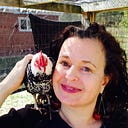The Myth of Harmlessness: The Real Underbelly of the Dairy Industry
When I went vegetarian at age 15, I thought that was the end of the road with what I needed to do to withdraw my support from animal cruelty. Mind you, I went vegetarian during a much less sophisticated time — the 1980s — an era when juveniles like myself would spend our days collecting neon zebra print leggings and listening to mixtapes, which is to say, I didn’t know any better. It would be 13 or so years before I would learn enough about animal agribusiness to understand that vegetarianism was just the beginning — a genuinely laudable step for cutting out one aspect of needless cruelty, suffering and violence — but really just a step. When I learned more, thanks to the books I was reading, the films I was watching and the activists I was meeting, I learned that some of the products I was still consuming were just as exploitatively and cruelly obtained as the flesh I had long ago given up for ethical reasons. In fact, I learned that these industries and the meat industry are inextricably wound together. This is the first in a series I will be writing about the often-hidden corners of animal agribusiness, what many consumers unknowingly shrug off as harmless byproducts. My inaugural piece is on the dairy industry.
“The milk of human kindness,” was an expression coined by Shakespeare and uttered by Lady Macbeth in an attempt to…
